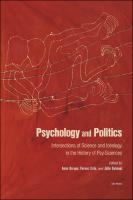Psychology and Politics
Intersections of Science and Ideology in the History of Psy-Sciences
Contributor(s)
Borgos, Anna (editor)
Gyimesi, Júlia (editor)
Erős, Ferenc (editor)
Collection
Knowledge Unlatched (KU)Number
104374Language
EnglishAbstract
Psy-sciences (psychology, psychiatry, psychoanalysis, pedagogy, criminology, special education, etc.) have been connected to politics in diverse ways during the 20th and 21st centuries. Besides episodes in the history of psychoanalysis in politically troubled times, the chapters in the book explore the full variety of “psy” disciplines in dictatorships and authoritarian regimes such as Nazi Germany, East European communist regimes, a Latin-American military dictatorship, and the South African apartheid regime, discussing psychology’s role in legitimating and “normalizing” dictatorships. The essays’ authors also explain the ideological and political foundations of ideas concerning mental health and illness in Russia, Hungary, post-war Transylvania, and Germany. Currents of critical psychology are also discussed, which try to understand how academic, therapeutic, and everyday psychological knowledge is produced within the power relations of modern—market or state—capitalist societies.
Keywords
congresses; Eastern Europe; political psychologyDOI
10.7829/9789633863121ISBN
9789633863121, 9789633862827Publisher
Central European University PressPublisher website
http://ceupress.com/Publication date and place
2019Grantor
Classification
Psychology
Sociology


 Download
Download